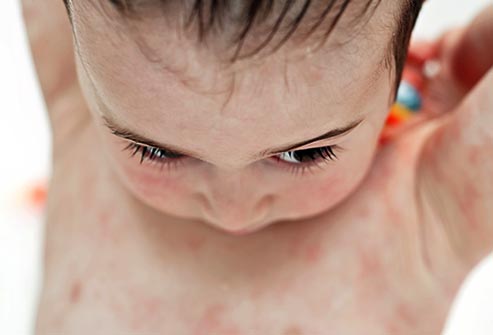Eczema flares : You can keep it under control by managing the things that set flares off. Getting the skin Dry is a major Eczema trigger. Keep your child’s skin Moisturized mostly. Ointments like Petroleum Jelly are way better option to keep the skin Moisturized than Lotions. Baths can dry out skin, so use Warm Water, not Hot. Then put a good Moisturizer on while your child’s skin is still soft after a bath.
Will It Ever Go Away?
Your child may not have Eczema forever. For many kids, the itchy patches start to go away at about school age. Others may have Eczema into their teens and as adults, though. Sometimes, Eczema seems to have vanished only to reappear during puberty. Changes in hormones may be to blame.
Stop Your Child the for Scratching
Scratching can make Eczema worse and cause patches of skin to get thick. Avoid itchy fabrics like wool. Keep her nails trimmed short. If she tends to scratch in her sleep, give her light, comfortable gloves to wear to bed. A wet, cool washcloth on irritated spots can ease the urge to scratch.
Help Kids Keep Cool
Sweating can cause Eczema to itch, too. Stick with light, breathable fabrics like cotton. Try light layers so it’s easy for her to stay comfortable when temperatures change. Keep your house cool, especially her bedroom. Use lightweight sheets and bedspreads, too.
Allergy Attack
Allergies and Eczema often go hand in hand. Ask your doctor if your child should be tested for food or other allergies. Avoid triggers like pets, especially in your child’s bedroom. Wash sheets often in hot water, and use dust mite covers on mattresses and pillows. Go without carpet and drapes, if possible. They trap allergens.
De-Stress
Stress can cause itching and redness for kids with Eczema. Help your child identify stressful situations, like a big test at school or public performance. Then talk about ways she can manage that stress. Some ideas: Take a few deep breaths, meditate, think of something else as a distraction, or take a break.
What the Doctor May Suggest
Your doctor may prescribe a cream or ointment with a corticosteroid in it. These should only be used with a prescription because the dosage is specific to your child. Don’t use this for more than the prescribed amount of time. It can make the skin thin if it’s used for too long. Only put the ointment on areas of skin that have Eczema.
Other Medical Options
If your child has allergies, antihistamines can sometimes help ease itching. If your child’s rash is severe or infected, your doctor may prescribe other medicine, too. But remember: Preventive care can go a long way to keep Eczema from getting worse.
Control the Infection
Keep an eye out for signs of skin infection, like:
- Fever
- Redness
- Warmth around the affected areas of skin
- Bumps or blisters
Kids with Eczema are more likely to get infected. If your child has a skin infection like herpes or a staph infection, your doctor may prescribe antibiotics for it.
Eczema and Emotions
Children with Eczema may face teasing and embarrassment. And they may struggle with self-esteem. A support group or even a camp for kids with Eczema and other skin conditions can be a great way to help your child make friends who understand what she’s going through. The National Eczema Association has a patient conference and kids’ camp each summer.
Read more about What’s Life With Eczema Like?

